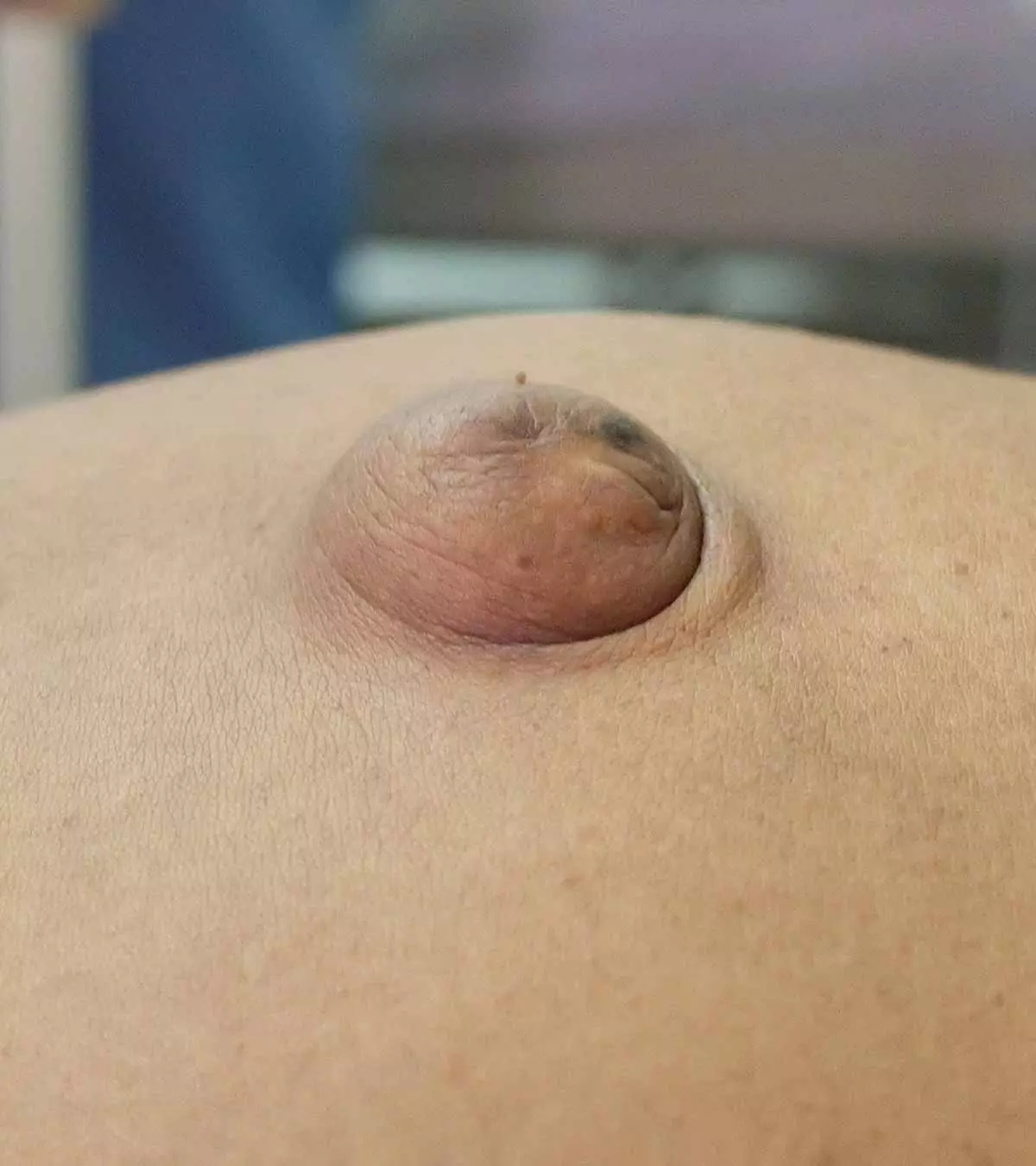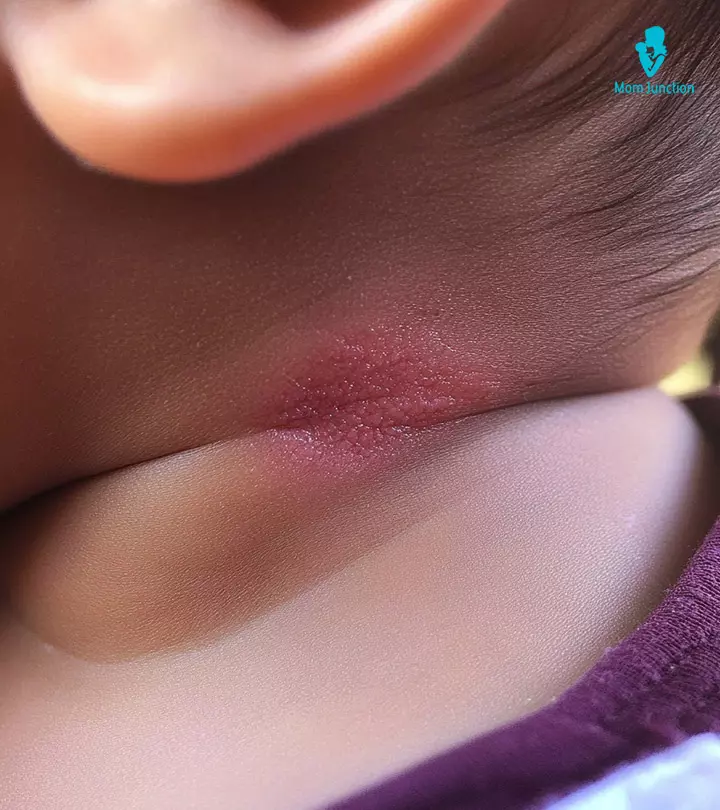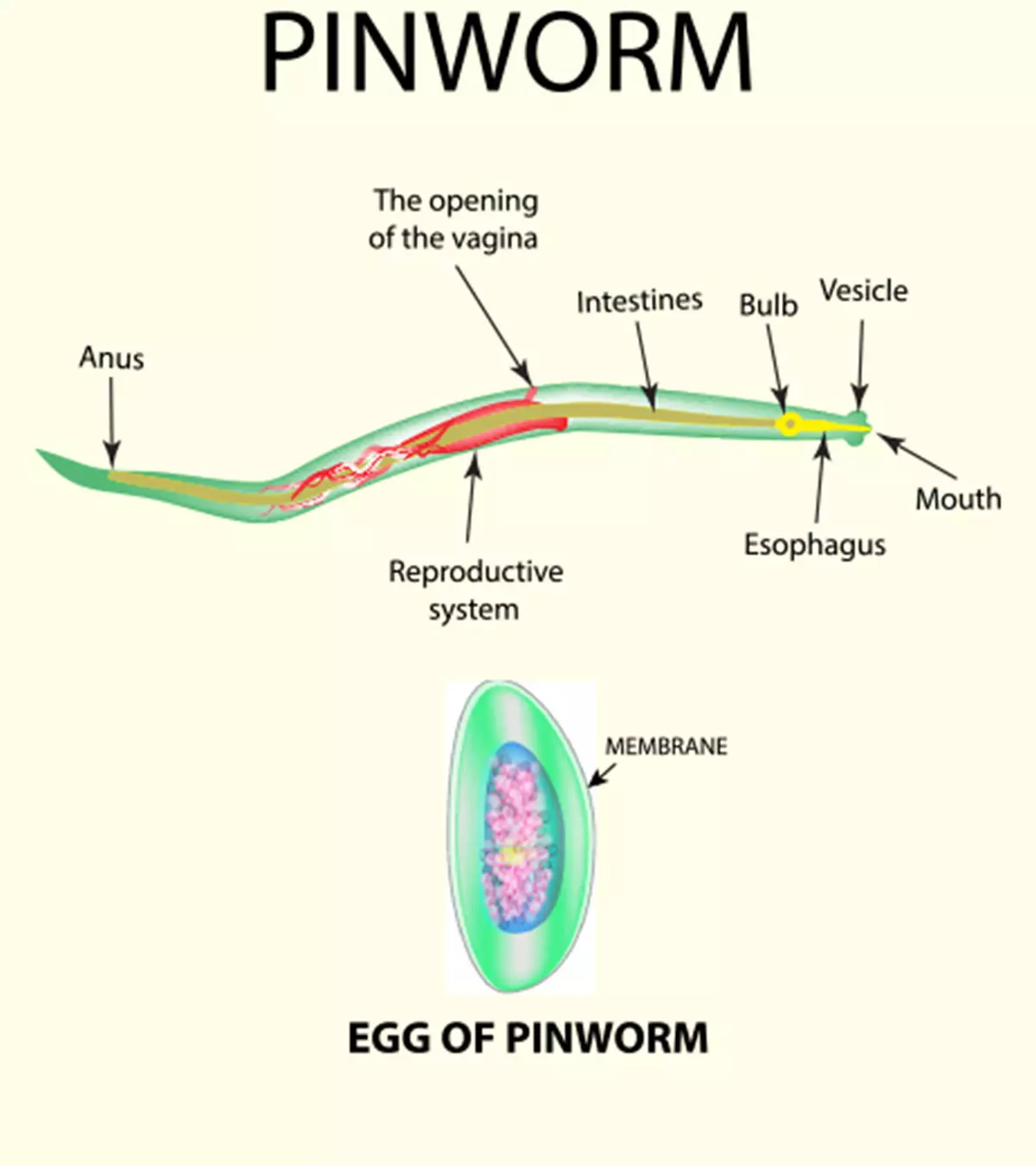
Image: iStock
The carpal tunnel is a passageway containing nine tendonsi Tissue connecting muscles to the bones and allowing movement and one nerve (the median nerve) that runs through the base of the hand. In the case of carpal tunnel syndrome during pregnancy, the carpal tunnel swells and presses against this sensitive nerve, causing pain.
Systemic illnesses, such as arthritis or trauma, and physical activities, such as repetitive hand movements, are common risk factors. Pregnancy also increases the possibility of developing carpal tunnel syndrome, which has an incidence rate of 62% in pregnancy. A report suggests that three to five in ten pregnant women experience the symptoms of carpal tunnel syndrome (1) (2).
Read this post to learn about the symptoms, causes, diagnosis, and treatment of carpal tunnel syndrome during pregnancy.
Key Pointers
- Tingling hand pain, numbness, burning sensation in the fingers, and arm and shoulder pain could be signs of carpal tunnel syndrome during pregnancy.
- The condition is detectable using electrodiagnostic methods.
- You must avoid postures and sleeping positions that escalate your symptoms.
- Moreover, topical medications, fluid draining massages, and physiotherapy effectively alleviate the pain and carpal tunnel syndrome symptoms in pregnancy.
What Causes Carpal Tunnel Syndrome In Pregnancy?
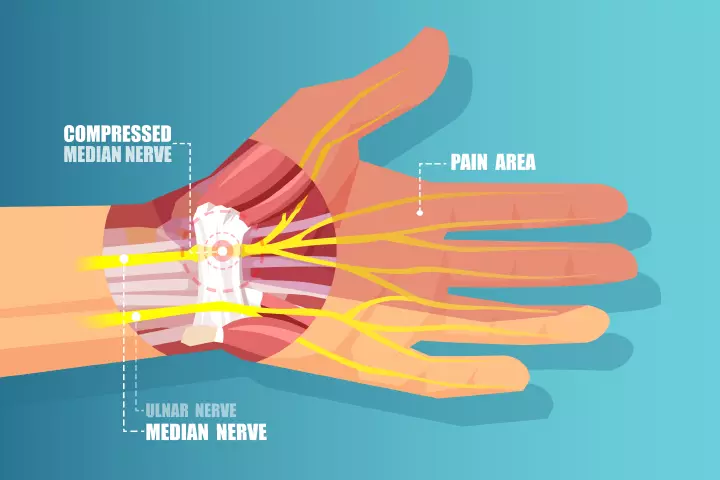
The pregnancy-related causes of swelling in the wrists or carpal tunnel syndrome include
- Hormonal changes: Hormonal fluctuations during pregnancy can cause fluid retention in the body, resulting in swelling, pregnancy-induced edema, and compression of the wrist nerves and pain (1).
- Increased blood flow: Your blood volume increases by up to 50% during pregnancy. This additional fluid increases pressure and swelling in the blood vessels throughout your body, including the carpal tunnel of the wrist, causing nerve compression and pain (3).
When Does Carpal Tunnel Syndrome In Pregnancy Start?
Pregnancy-related carpal tunnel syndrome is most commonly noted in the third trimester or after 30 weeks but can occur at any time during the pregnancy or even after birth.
The symptoms usually improve or disappear after childbirth as the additional fluid pressure and retention reduce (1). However, some experience persistent symptoms for a year or more after delivery (4) (5). It could be because new mothers use their hands and wrists almost continuously, resulting in exacerbated or new hand and wrist symptoms (3).
What Are The Symptoms Of Carpal Tunnel Syndrome In Pregnancy?

The severity of carpal tunnel syndrome symptoms ranges from minor discomfort and occasional ache to severe pain. You may experience (6) (7)
- Numb hands
- Tingling pain such as pins and needles
- Pain in one or both wrists that may worsen at night
- Weakness such as loss of grip strength and dexterity (2)
- Pain in the fingers, thumb, and hand
- Burning sensations in the fingers
- Pain radiating into the arm and shoulder
These signs and symptoms may disrupt your daily activities and sleep and may worsen with (1) (2):
- Repeated hand movements
- Extended periods of maintaining the same hand positions
- Forceful activities such as putting weight on stretched arms
- Extreme wrist positions
- Flexed or bent wrists while sleeping
Ruli, a mother and blogger, shares her encounter with carpal tunnel syndrome during pregnancy, “I felt pain in my hands, especially my wrists. The syndrome is called carpal tunnel syndrome. I have just felt pain in the wrists near the thumbs, and it makes my hands difficult to hold objects tightly, but I can sleep well at night. I once consulted with my doctor, and she said that the symptoms usually would go away gradually after I gave birth (ⅰ).’’
Are Some Pregnant Women At An Increased Risk?
You may be at an increased risk of developing carpal tunnel syndrome in the following cases (4):
- A first-degree relative has the condition
- Previous wrist injuries
- Pre-existing or gestational diabetes, causing slower nerve conduction (5)
- Carpal tunnel syndrome in a previous pregnancy
When Should You Call A Doctor?

Since swelling is a normal part of pregnancy, you may not notice it. However, you should consult your doctor in the following cases (1)
- Your hands or feet are more swollen than usual
- Severe or persistent wrist pain
- Your pain has worsened
- Persistent symptoms even after six weeks of delivery
How Is Carpal Tunnel Syndrome Diagnosed During Pregnancy?
Your healthcare provider may diagnose carpal tunnel syndrome based on your medical history and symptoms. However, it is often a misdiagnosed condition. Therefore, if you have significant symptoms, your doctor may recommend the following tests to confirm the diagnosis and examine your nerve functioning: (3) (8):
- Conventional tests: TineliA test to diagnose nerve compression by tapping on the wrist’s median nerve between the tendons , PhaleniA test where the patient presses the back of the palms against each other to check if it creates tingling or numbness , and median nerve compression tests (9)
- Nerve conduction velocity test: An electrodiagnostic study where the doctor places small electrode stickers on the affected hand and arm and uses low-level electrical stimulation to measure nerve activity
- Electromyography (EMG): An electrodiagnostic procedure where the doctor uses a small needle to examine muscle activity in various areas of the affected arm and hand
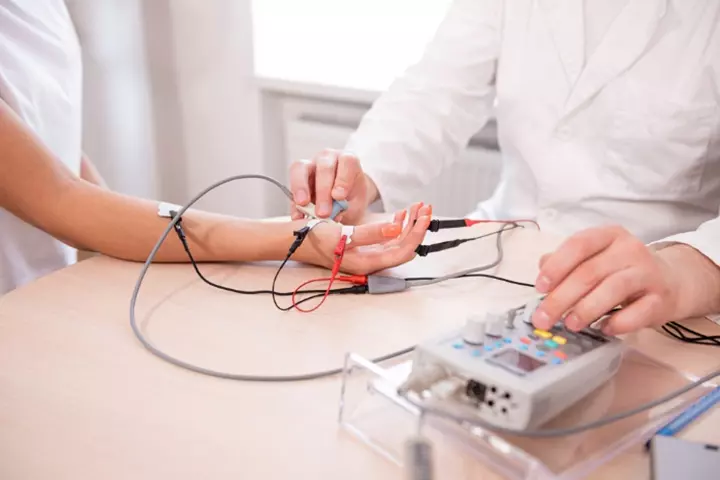
While these tests may be uncomfortable, they do not cause adverse perinatal outcomes and lasting pain.
How To Manage Carpal Tunnel Syndrome During Pregnancy?

The treatment of carpal tunnel syndrome can be determined by various factors, including the symptoms’ severity and your pregnancy stage. However, it is advisable to begin with conservative therapy during pregnancy.
The following are some simple measures that may help alleviate the symptoms of carpal tunnel syndrome (7):
- Avoid positions or activities that aggravate your symptoms
- Sit with the affected hand raised on the armrest
- Avoid sleeping on the side of your affected hand
- Maintain a straight wrist position
- Avoid complete flexion and extension positions
- Apply ice to your wrist (covered in a tea towel) for 20–30 minutes every 2–3 hours
- Run cold water over the wrist
- Wear a compression bandage
- Avoid smoking
 Quick tip
Quick tipDepending on the severity of your symptoms, your doctor may suggest the following treatment options:
- Medications, such as topical numbing agents and pain relief corticosteroidiMedication used to reduce inflammation and overactive immune system injections (usually a combination of steroids and a local anesthetic), for symptomatic relief (3)
 Health fact
Health fact- Physiotherapy and occupational therapy, including regular fluid drainage massage, gentle exercises, and the use of a wrist splint or wrist brace, particularly at night, to keep your wrist in a neutral position (1)
- Open or endoscopic surgery in severe cases to enlarge the carpal tunnel. It frequently helps with pain and function. However, if the surgical treatment isn’t urgent, delay it until delivery (3).
What Are The Alternative Therapies For Carpal Tunnel Syndrome During Pregnancy?
Complementary and alternative medicine (CAM) or therapy is useful for relieving carpal tunnel syndrome symptoms.
However, seek the advice of a qualified and registered complementary therapist who is skilled in treating pregnant women. Some CAM methods that are safe during pregnancy are listed below (4):
- Acupuncture and acupressure: Carpal tunnel syndrome can be relieved by applying pressure to a specific point on the wrist, pericardium point six, at regular intervals. According to some studies, it is more effective than using wrist splints.
- Aromatherapy: It includes using compresses soaked in warm or cool water with essential oils, such as cypress and lemon. However, not all essential oils are safe for use in pregnancy. For example, juniper berry oil may affect your kidney(s).
- Osteopathy: It is a part of chiropractic care that focuses on realigning the muscles, bones, joints, and ligaments. While it may not treat carpal tunnel syndrome, it can help relieve pressure in your wrists, hands, and fingers.
- Reflexology: It involves applying pressure to certain points on your foot to relieve wrist pain. While there is no conclusive evidence that reflexology helps with carpal tunnel syndrome, it can be a calming treatment.
Can Carpal Tunnel Syndrome Be Prevented During Pregnancy?
While carpal tunnel syndrome cannot be easily avoided during pregnancy, minimizing wrist swelling will likely provide symptomatic relief.
You can reduce or prevent swelling during pregnancy by (4) (7)
- Reducing your salt, sugar, and fat intake
- Taking frequent breaks while doing repetitive activities
- Avoiding heavyweights
- Avoiding hanging your arm by your side for a prolonged time
- Keeping your shoulder, elbow, and hands in motion to prevent arm stiffness
- Lying down to rest during the day
- Drinking plenty of water
- Elevating your legs while sitting
- Doing simple hand exercises
- Wearing compression garments and a supportive maternity bra to relieve the pressure on your rib cage and breastbone
- Maintaining a healthy weight and eating a well-balanced diet
- Eating at least five servings of fresh fruit and vegetables a day
- Staying warm (10)
Will Carpal Tunnel Syndrome During Pregnancy Affect The Baby Or Mother?
No, while carpal tunnel syndrome during pregnancy may affect your daily activities and the wrist pain and swelling may be uncomfortable, it does not otherwise affect maternal health or the baby.
Carpal tunnel syndrome in pregnancy is quite common due to hormonal changes and increased blood flow. It mostly occurs during the third trimester and resolves after delivery. Simple measures such as applying ice packs, improving wrist positions, and avoiding repetitive hand movements can help alleviate pain. However, if your symptoms increase or are persistent, consult your doctor.
Frequently Asked Questions
1. Does having carpal tunnel mean I have preeclampsia?
You may experience localized swelling and pain in the hands and wrists as well as numbness during pregnancy in the case of carpal tunnel. These symptoms are also seen in preeclampsia, a more serious condition, and one can be mistaken for the other (12). Carpal tunnel syndrome mostly appears in people with high blood pressure, diabetes, and rheumatoid arthritis(13). Thus, carpal tunnel may sometimes mean that you might have preeclampsia. Therefore, taking your doctor’s opinion is important.
2. How long does carpal tunnel syndrome during pregnancy take to go away after delivery?
Carpal tunnel syndrome gets better once the baby is born. As fluid retention levels decrease, the symptoms start going away. However, in rare cases, the symptoms may last for up to three or more years after delivery (14).
3. Are there any exercises or stretches that can help alleviate carpal tunnel syndrome symptoms during pregnancy?
Performing exercises such as making a fist, straightening your fingers, and touching each finger individually with your thumb, can provide relief. It is recommended to repeat these exercises ten times each (15).
4. Are there any long-term effects of carpal tunnel syndrome during pregnancy?
In most cases, the condition typically resolves after delivery. However, if you experience intense pain that hinders your daily activities, it is advisable to seek medical advice (1).
Infographic: How To Manage Carpal Tunnel Syndrome In Pregnant Women?
Hormonal changes, water retention, and increased blood flow are some of the reasons for carpal tunnel syndrome among pregnant women. Some simple steps, like the ones in the infographic below, can help relieve pain during pregnancy. It is still recommended to talk to your doctor for the most effective treatment plan.

Illustration: Momjunction Design Team
Illustration: Carpal Tunnel Syndrome In Pregnancy: Symptoms And Treatment

Image: Stable Diffusion/MomJunction Design Team
Personal Experience: Source
MomJunction articles include first-hand experiences to provide you with better insights through real-life narratives. Here are the sources of personal accounts referenced in this article.
i. My carpal tunnel syndrome.https://rulihapsari.wordpress.com/
References
- Carpal tunnel syndrome and pregnancy.
https://www.pregnancybirthbaby.org.au/carpal-tunnel-syndrome-and-pregnancy - Robert H Ablove and Tova S Ablove; (2009); Prevalence of carpal tunnel syndrome in pregnant women.
https://pubmed.ncbi.nlm.nih.gov/19753825/ - Robyn Horsager-Boehrer. Carpal tunnel syndrome and pregnancy go hand in hand.
https://utswmed.org/medblog/carpal-tunnel-syndrome-pregnancy/ - Joanne Lewsley; (2020); Carpal tunnel syndrome in pregnancy (natural remedies).
https://www.babycentre.co.uk/a549291/carpal-tunnel-syndrome-in-pregnancy-natural-remedies - Pregnancy Care Guidelines: 60 Carpal tunnel syndrome.
https://app.magicapp.org/?language=en - Pregnancy: Carpal Tunnel Syndrome
https://healthy.kaiserpermanente.org/health-wellness/health-encyclopedia/he.pregnancy-carpal-tunnel-syndrome.zt1608 - Pregnancy-Related Carpal Tunnel Syndrome.
https://www.thewomens.org.au/images/uploads/fact-sheets/Pregnancy-related-carpal-tunnel-210319.pdf - Carpal Tunnel Syndrome.
https://www.ohsu.edu/brain-institute/carpal-tunnel-syndrome - Saeid Khosrawi and Raziyeh Maghrouri; (2012); The prevalence and severity of carpal tunnel syndrome during pregnancy.
https://www.ncbi.nlm.nih.gov/pmc/articles/PMC3544091/ - Carpal Tunnel Syndrome.
https://womenshealth.gov/a-z-topics/carpal-tunnel-syndrome - Carpal tunnel syndrome.
https://www.mountsinai.org/health-library/condition/carpal-tunnel-syndrome - Pregnancy: Hand Changes.
https://wa.kaiserpermanente.org/kbase/topic.jhtml?docId=aa2947 - Carpal Tunnel Syndrome, Explained.
https://kerlanjobe.org/carpal-tunnel-syndrome-explained/ - Long term follow-up of carpal tunnel syndrome during pregnancy: a cohort study and review of the literature.
https://pubmed.ncbi.nlm.nih.gov/17918501/ - Carpal Tunnel Syndrome During Pregnancy.
https://www.uhs.nhs.uk/Media/UHS-website-2019/Patientinformation/Pregnancyandbirth/Carpal-tunnel-syndrome-during-pregnancy-703-PIL.pdf
Community Experiences
Join the conversation and become a part of our nurturing community! Share your stories, experiences, and insights to connect with fellow parents.
Read full bio of Dr. Pamela Adhiambo Muga
Read full bio of Reshmi Das
Read full bio of Rebecca Malachi
Read full bio of Aneesha Amonz















